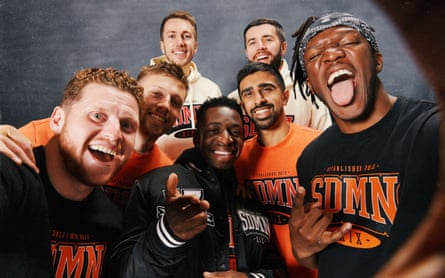The BBC risks becoming the Titanic of the media world and culturally irrelevant to gen Z unless it embraces a “radical shift” towards reaching young audiences, the manager of one of the most successful YouTube collectives has warned.
Jordan Schwarzenberger, the manager of the Sidemen, who have well over 100 million subscribers between them, said he believed the corporation produced “great entertainment” and wanted it to succeed.
However, he said the BBC and other main broadcasters were showing a “defeatist mentality” by demanding new rules forcing digital platforms such as YouTube to give their content prominence.
In an interview with the Guardian, he said the BBC’s cultural connection with older audiences was not shared by younger audiences, who increasingly spurn traditional channels and streamers.
“It’s a Titanic,” he said. “That’s not to say that it’s going to crash today, but it’s so big and it’s so unfit for purpose in relation to these big changes that are far bigger than them.
“The way that consumption habits have shifted over the last five years is almost more drastic than it was in the previous 50 years. You have a pre-TikTok and post-TikTok split in the way that consumption was felt and experienced by people.
“That existential question is a big one, because I don’t think it’s going to be an answer that the BBC likes, with a young audience that simply doesn’t see it. They see a global competitive market of content and options. Why am I forced to pay?”

The Sidemen, who include the creator, rapper and occasional boxer KSI, are one of Europe’s most successful YouTube collectives. Schwarzenberger, 28, said he was intervening out of concern that no one was being “brutally honest” about gen Z’s relative lack of connection with the BBC.
“They’re not coming back until those assumptions shift for this new world, which is very different,” he said. “My sense is that they do know that this is happening and they do understand it, but it’s so seismic, it’s so existential. Is it the Sidemen or the BBC who has more relevance amongst gen Z? It’s the Sidemen all day, every day – and they’re just one creator.”
The BBC and other leading broadcasters are pushing to have enforced prominence on platforms such as YouTube, pointing to the quality, cultural relevance and trustworthiness of the content they produce.
Schwarzenberger was, in part, reacting to remarks by Patricia Hidalgo, the director of children and education at the BBC, who told the Guardian that the amount of American content children consumed on YouTube risked weakening their connection to British culture and language.
She said YouTube’s algorithm was pushing US content, such as the children’s creators Ms Rachel and Blippi, towards British children.
Schwarzenberger said the answer was not to “cheat and bend the rules”, but to act as an investor in the next generation of up-and-coming content creators.
He said: “It’s actually about leaning in to the distribution kids today want, and the type of content they want in the places they want it, in the format that they’re liking and enjoying. That might look and feel different to Blue Peter or look and feel different to the rules that we’re used to.
“My frustration is that it’s this defeatist mentality which exists in a lot of big institutional broadcasters, which is that we’re up against this all-consuming behemoth of global US and Chinese technology that we’re never going to beat.”
Schwarzenberger said there was a disconnect between the types of content watched by younger people and the media consumed by BBC executives.
“A lot of people I speak to aren’t actually active,” he said. “There’s a disconnect between where attention is moving and where the executives who are running the industry are themselves.”
Disclaimer : This story is auto aggregated by a computer programme and has not been created or edited by DOWNTHENEWS. Publisher: theguardian.com







